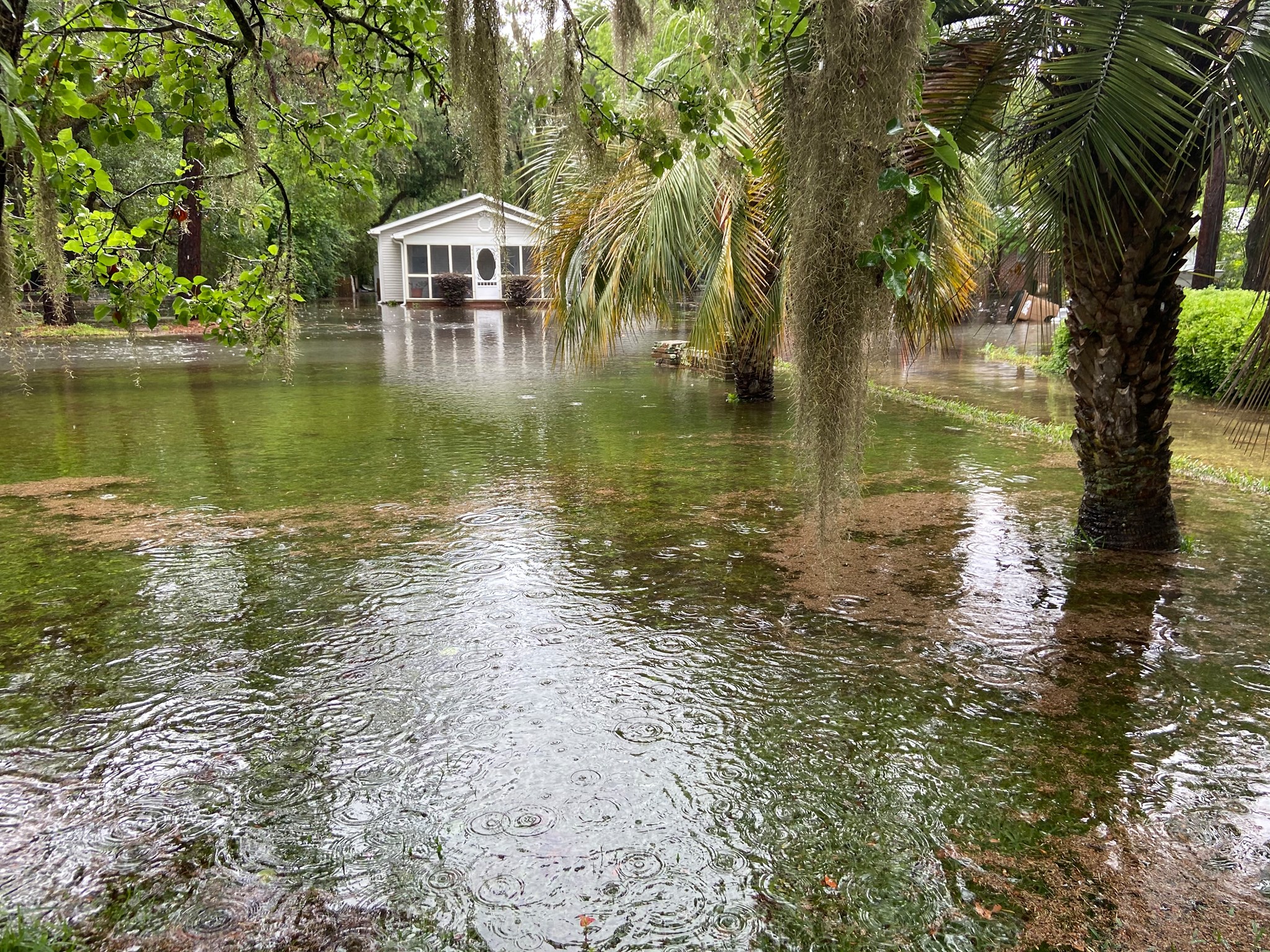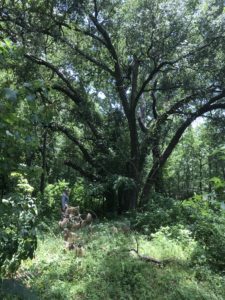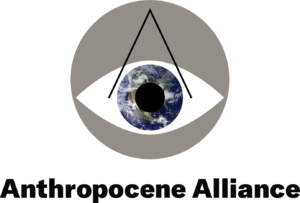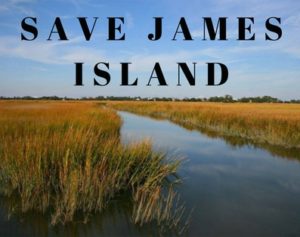Apply now to join our next cohort of Community Science Fellows and Community Leads!

Flooding in May 20, 2020. Photo taken on Howle Avenue on May 21, 2020. (Save James Island, 2020f).
Since first meeting with Thriving Earth Exchange in April 2020, the James Island team has grown to encompass residents living near both the Central Park cluster and the Riverland Oaks cluster. Together, residents have worked together and with the South Carolina Coastal Conservation League to commission a report by an external stormwater expert, Dr. Steve Emerman, about the state of the current stormwater system and its ability to accommodate further development. The report is available here and at the bottom of this page, as are multiple memos prepared by Dr. Emerman in response to various questions regarding his findings.
Residents are also working hard to ensure that their local politicians read and respond to the report. Their ask is simple: fix the current flooding before allowing any more development on James Island.
Media coverage and meetings:
The City of Charleston, South Carolina, is currently considering approval of two proposed urban developments on James Island. The proposed Central Park development would involve the conversion of 10.35 acres of woods and wetlands, including grand oak trees and dense undergrowth, into 38 single-family lots. The proposed Riverland Oaks development would involve the conversion of 28.6 acres of woods with grassed areas and pockets of dense vegetation into 146 single-family townhomes. Due to the timing of submission of the stormwater management plans for the two
developments, the Central Park development is being evaluated under the older Stormwater Design Standards Manual (2013), while the Riverland Oaks Development is being evaluated under the newer Stormwater Design Standards Manual, which became effective on July 1, 2020.

The communities adjacent to these proposed developments already experience significant flooding on a routine basis, and citizen activists have been able to show that the existing drainage system is inadequate under current conditions. The community is concerned about the impact that the destruction of these wood and wetland habitats to create more impervious surfaces will have on their properties. The goal of this project is to determine whether the stormwater management plans for the proposed Central Park and Riverland Oaks developments are consistent with the respective stormwater manuals under which they are being evaluated.
For a brief introduction to the situation on James Island from the perspective of a local resident, click here.
Franny Henty is a long-time resident of James Island (20+ years) and is a mother and a grandmother. As a local realtor, she is intimately familiar with James Island and its people, and is committed to protecting the island for both her clients and her grandchildren. Franny has personally experienced flooding and its associated costs, and is concerned as a realtor about the constant and increasing threat to both long-time residents and new arrivals. She dreams of the day when yards and living rooms don’t flood and one can safely fish and kayak in the many streams and channels on James Island.
Susan Milliken is a community activist who is passionate about protecting and preserving the sea islands of Charleston County, SC. A resident of James Island for over 22 years, Susan and concerned residents founded “Save Harbor View Road” in the early 2000’s when trees and greenspace were threatened by a county road widening project. After success in convincing Charleston County to redesign the project to save trees and greenspace, “Save James Island” was organized as a small group on Facebook concerned about the massive over development of James Island. Now some 10 years later, “Save James Island” has grown to over 4,500+ local residents who are focused on taking action when poorly planned development proposals threaten our trees, greenspace, creeks, rivers, marshes, native wildlife, flora and fauna on our unique Low Country island. A former Texas attorney, Susan spends most of her time now advocating for South Carolina municipalities to adopt better development practices with the help of local residents through “Save James Island”.
Jimmy Mazyck is a James Island native and a retired firefighter who has lived in Laurel Park for 21 years. In order to save his neighbors and himself, he has been cleaning ditches and pipes on a volunteer basis for years. Nevertheless, his entire home floods several times per year. He is the lone member of the James Island ditch patrol, and has contributed enormously to documenting the poor state of stormwater infrastructure on James Island.
Theodosia Wade has been a member of the Laurel Park subdivision on James Island since 2010 and is an Emeritus Professor of Pedagogy in Biology at the Oxford College of Emory University. As someone who has taught environmental science for over 20 years,she is concerned about the flooding in her neighborhood, as well as the resulting septic system failures, which threaten not just residents but also all the leisure opportunities visitors come to James Island for. Who wants to kayak on a creek that reeks of sewage, or risk being stranded when roads overflow?
Julie Hallman is a local real estate agent and a 10-year resident of the Woodland Shores community. She has long been concerned about the over-development of James Island and has experienced local flooding as a result of new construction in her area. Julie believes that when you take away all the things that make a place special, you risk ruining the community itself.
Dr. Steven H. Emerman has a B.S. in Mathematics from The Ohio State University, M.A. in Geophysics from Princeton University, and Ph.D. in Geophysics from Cornell University. Dr. Steve Emerman has 31 years of experience teaching hydrology and geophysics and has 66 peer-reviewed publications in these areas. Dr. Emerman is the owner of Malach Consulting, which specializes in hydrologic modeling, especially related to forestry, mining and urban development.
Dr. Kirstie Dobbs received her PhD from the Political Science Department at Loyola University Chicago and her BA in International Studies and French at Butler University. She is currently a full-time lecturer in the Department of Political Science and Public Policy at Merrimack College, where she teaches in the Early College Program. Working at the intersection of both Comparative and International Politics, she analyzes political behavior in transitioning democracies. Her broad objective as a scholar is to empower young people and their communities to act as powerful agents of change. She bridges this commitment with her research by working with the public to create new opportunities for collaborative engagement on resolving local and global issues.

Anthropocene Alliance (Aa) is a Florida-based nonprofit that builds grassroots coalitions in communities impacted by climate change and environmental abuse. We provide support and training to community leaders, and connect them to the government agencies, nonprofit programs and pro bono professionals that can help them. We help them rally, protest, and organize to stop flooding, mitigate global warming, and end environmental injustice.
Our core initiative, Higher Ground, is the largest flood survivor network in the country. The network is composed of 51 member-chapters from 20 states plus Puerto Rico, serving a total of 500,000 flood survivors and their neighbors.

Save James Island opposes the massive development occurring on James Island that threatens our island’s character, history, beauty, wildlife, and quality of life.
We work with the James Island community to Preserve and protect the green spaces, trees, waterways and marshes of James Island; advocate for appropriate zoning, infrastructure improvements, storm water management, and building design standards tailored to our unique community; and advocate for a bike and pedestrian-friendly James Island, with increased public transportation and affordable housing options for residents.
We also support local businesses. Please join us in doing so.
2020 Jul9 James Island Report by Dr. Emerman Download
2020 Jul26 AECOM drainage study questions Download
2020 Jul27 Henty_Memo Download
2020 Aug7 Downstream stormwater capacity questions Download
2020 Aug7 Charleston_Stormwater_Manual_Questions Download
2020 Aug10 Dr. Emerman response to Stormwater Mgmt Director letter Download
2020 Aug12 James Island Drainage Council Testimony Download
2020 Aug23 Dr. Emerman response to Post and Courier op-ed Download
2020 Sep6 Dr. Emerman letter to Mayor Tecklenburg Download
2020 Sep13 Dr. Emerman letter to SCDHEC Download
2020 Sep17 Sealed_Outfall_Pipe_Question Download
2020 Sep27 Sealed_Outfall_Pipe_Question2 Download
2020 Sep29 SCCCL_Memo Download
2020 Oct4 Rep_Spencer_Wetmore_Memo Download
2020 Oct18 Dr. Emerman letter re Area4 improvements Download
2020 Oct30 Dr. Emerman response to Rep Wetmore Download
2020 Dec10 Rep_Spencer_Wetmore_Memo Download
2020 Dec13 Rep_Spencer_Wetmore_Memo Download
2021 Jan10 Dr Emerman memo to SCCCL re: watershed boundaries Download
2021 Jan20 Henty_Memo Download
2021 Mar21 SCCCL_Memo Download
2021 June13 Milliken_Memo Download
2021 June17 Henty_Memo Download
(c) 2024 Thriving Earth Exchange